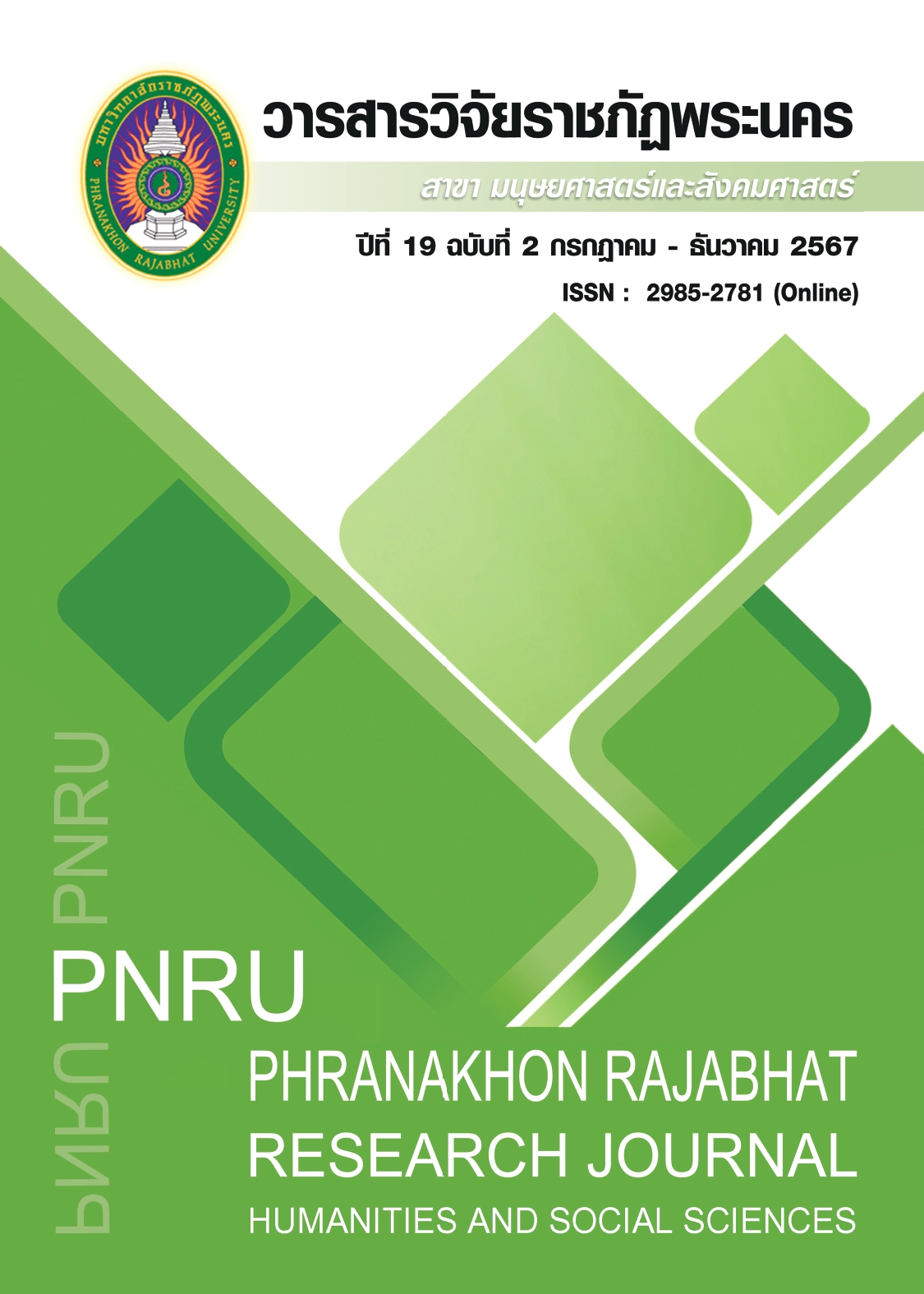INNOVATIVE PARTICIPATORY ADMINISTRATION OF SECONDARY SCHOOLS WITH RELATIONAL TRUST
Main Article Content
Abstract
This research aimed to 1) analyze the current state of participatory management in secondary schools based on relational trust, 2) develop an innovative model for participatory management in secondary schools using relational trust, and 3) evaluate and validate the innovation in participatory management for secondary schools with relational trust. The study employed a mixed-method approach. Quantitative research involved a sample of 405 school administrators, selected through simple random sampling, with data collected via questionnaires. Statistical analysis included frequency, mean, and standard deviation. For action research, key informants consisted of 27 individuals, including school directors, educational administrators, and experts in educational management. Data were collected through the professional learning community (PLC) process and analyzed using inductive content analysis. The findings revealed that: 1) The concept of participatory management in secondary schools with relational trust encompasses principles of school management, participatory management theories, relational trust, and brainstorming techniques to foster innovation using the SCAMPER technique. 2) The innovation development resulted in a management model integrating two core models: the UNITY Model and the SMART Model, which follow a systematic cycle of planning, implementation, monitoring, and improvement. The UNITY Model comprises five key components: unity, networking, initiative, teamwork, and outcomes. The SMART Model focuses on development through technology, sufficiency, research, ethics, and success to ensure comprehensive management and holistic school development. 3) The evaluation and validation of the innovation indicated a 96% approval rating in terms of suitability and feasibility.
Article Details

This work is licensed under a Creative Commons Attribution-NonCommercial-NoDerivatives 4.0 International License.
Each publish articles were copyright by Phranakorn Rajabhat University
Any contents which appeared in each articles in the journal were authors personal opinion. It did not relate to Phranakorn Rajabhat University and other instructors in the university. Each authors would take responsibility on their articles. If there are any mistake, the authors will take responsibility themselves
References
Bryk and Schneider. (2002). Identify important determinants of RELATIONAL TRUST. Respect, personal regard for others competence, and integrity.
Bureau of Upper Secondary Education Administration. (2017). Driving Thai Secondary Education 4.0 for 21st Century Employment. Office of the Basic Education Commission, Ministry of Education: Cooperative Printing of Agricultural Cooperatives of Thailand. (In Thai)
Rattanadechgumjay, C. (2021). Report on School Management in the Area of Participatory Management Innovation: The Step BL Model to Enhance School Efficiency. Nakhon Pathom: Nakhon Pathom Provincial Office of Education. (In Thai)
Cohen and Uphoff. (1980). “Participation’s Place in Rural Development : Seeking Clarity Through Specifity.” Word Development.
Crawford, M., & Herrmann, A. (2018). Distributed leadership in schools: A practical guide for learning and improvement. Taylor & Francis.
David C. McClelland. (1961). The Achieving Society. (New York : Van Nostrand)
Hair, J. F., Black, W. C., Babin, B. J., Anderson, R. E., & Tatham, R. L. (2010). Multivariate Data Analysis (7th ed.). Prentice Hall.
Harris, A., & Muijs, D. (Eds.). (2018). Improving schools through collaborative enquiry. Routledge.
Khunkaeo, T. (2023). Factors Affecting Personnel Administration of Schools under The Secondary Educational Service Area Office Nakhon Sawan. Journal of MCU Social Science Review, 12(3), 83-95. (In Thai)
Ministry of Education. (2003). National Education Act of 1999 and Amendments (Second Edition) of 2002. Bangkok: Kurusapa Business Organization Printing Press. (In Thai)
Nakhon Pathom Provincial Education Office. (2022). Report on the Monitoring and Evaluation of the Educational Management System to Support the Inspectorate for Fiscal Year 2022. Nakhon Pathom: Nakhon Pathom Provincial Education Office. (In Thai)
National Health Commission Office. (2022). The Next Normal: Life in the Next Phase and Adaptation After the COVID-19 Situation. Bangkok: Pim Dee Publishing Co., Ltd. (In Thai)
National Innovation Agency. (2019). Innovation Management for Organizations. Bangkok: Trust Corporation Management Institute. (In Thai)
Ozyaprak, M. (2016). The effectiveness of SCAMPER technique on creative thinking skills. Journal for the Education of Gifted young scientists, 4(1), 31-40.
Chantrat, P. and Uthairat, W. (2019). A Participatory Management Model to Support the Development of an Integrated Curriculum for Promoting Good Citizenship in Secondary Schools under the Office of the Basic Education Commission. Journal of Education Studies, 47(1), 280-294. (In Thai)
Manyat, P., Teeravanitrakul, S. & Rakngam, C. (2020). Model of secondary school administration to world class standard schools under the office of secondary education service re, region 7. Burapha University, Chonburi. (In Thai)
Smylie, M. A., & Hart, A. W. (Eds.). (2018). Building collaborative capacities in learning communities: Tools for practical school improvement. Teachers College Press.
Chamchoi. S. (2018). Educational Administration in the Digital Era. Bangkok: Chulalongkorn University Press. (In Thai)
The National Economic and Social Development. (2022). Quality Education and Sustainable Development Goals Thailand SDG Review. Retrieved from https://www.nesdc.go.th/nesdb_en/more_news.php?cid=16 [2024, 25 Jun.] (In Thai)
Rakthai, T. and Aujirapongpan, S. (2017). Open Innovation System: The Success of Innovation Developing in Universities. Songklanakarin Journal of Management Sciences, 34(2), 135-160. (In Thai)


